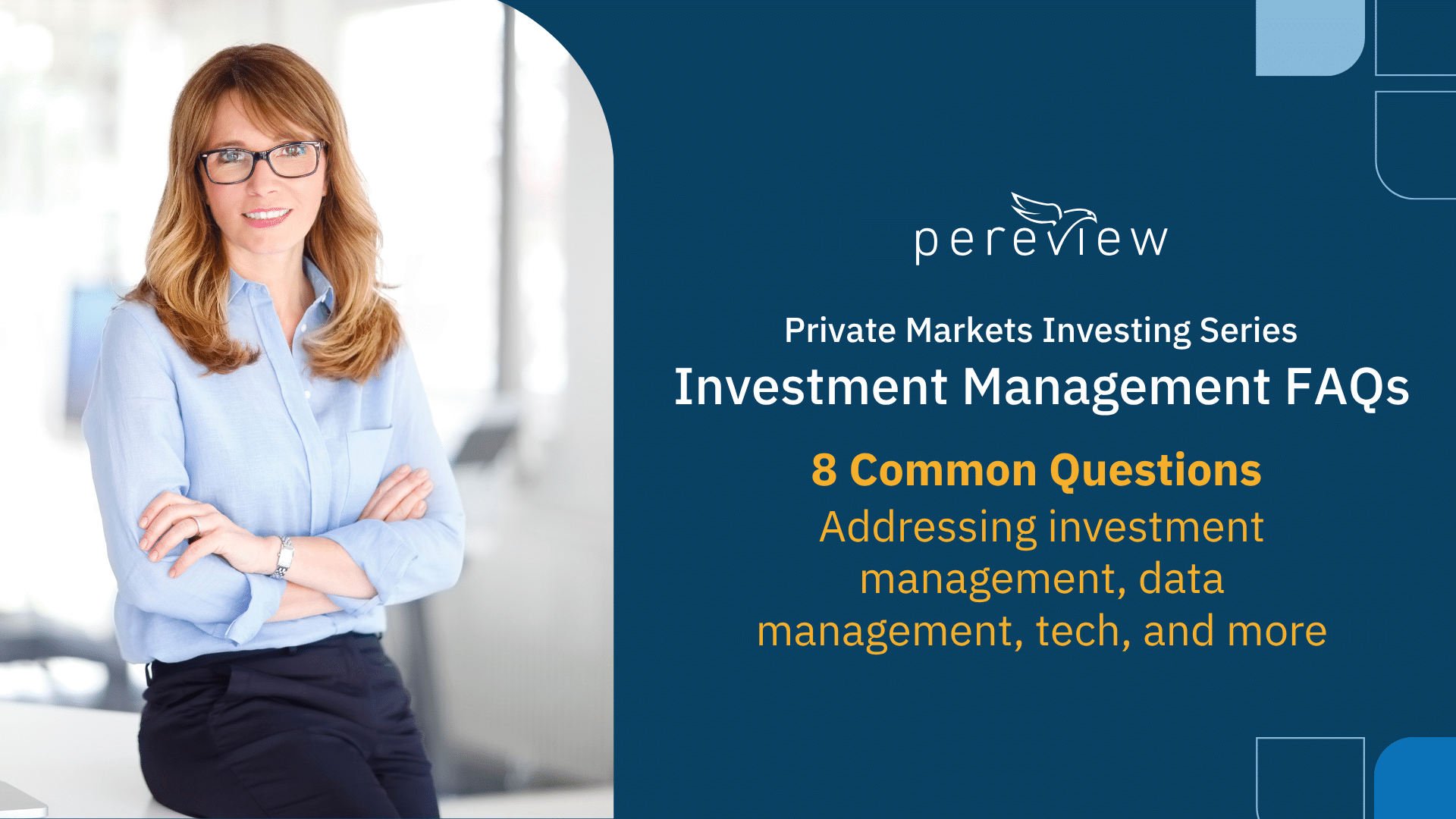Managing real estate investments requires more than just tracking assets – it demands a clear understanding of capital strategy, fund-level oversight, investor relations, and risk management. As the market grows more complex and data-driven, investment managers need tools that consolidate information and provide actionable insights.
This guide answers common questions about real estate investment management software, focusing on how platforms like Pereview help firms automate workflows, streamline reporting, and unlock performance.
What is real estate investment management software?
Real estate investment management software is a centralized system that enables investment managers to oversee fund-level activity, capital flows, and portfolio performance. These platforms integrate operational and financial data, track investor commitments, and support compliance workflows. By reducing reliance on spreadsheets and siloed systems, software like Pereview gives firms a holistic, real-time view of their real estate investments – from acquisitions to dispositions. Teams can also track and manage fee structures, JV agreements, and complex organizational hierarchies within a single source of truth.
How is investment management different from asset management?
While real estate asset management focuses on optimizing individual property performance, real estate investment management is concerned with broader fund strategy, capital planning, and investor outcomes. Investment managers oversee a portfolio’s financial architecture – raising capital, managing distributions, evaluating risk, and communicating with limited partners (LPs). A unified platform helps align asset-level performance with investment goals, ensuring every property contributes to fund-level returns. This holistic view also enables strategic rebalancing across portfolios and deeper insight into market trends affecting the firm’s overall investment thesis.
Why is real estate investment management software important?
Firms managing multiple funds, investors, and assets often struggle with fragmented data and time-consuming reporting. Real estate investment management software solves this by:
- Automating capital calls and distributions
- Standardizing investor reporting
- Providing fund-level analytics and forecasting
- Ensuring compliance and audit readiness
Additionally, investment teams benefit from increased transparency, stronger data integrity, and reduced time spent manually reconciling information across departments. This supports more agile investment decisions and ensures consistent performance monitoring across complex portfolios.
What features should I look for in an investment management platform?
The best platforms combine data management, process automation, and reporting functionality. Key features include:
- Fund-level performance dashboards
- Automated financial consolidations
- Capital commitment tracking
- Investor portal access
- Scenario modeling and forecasting
- Integration with accounting and property systems
- Role-based access and security controls
Pereview, for example, consolidates information from across your tech stack, allowing your team to manage the full investment lifecycle on a single platform. This also means quicker onboarding for new users, faster data analysis cycles, and a stronger foundation for predictive analytics or machine learning applications.
How does investment management software help with capital calls and distributions?
Manually managing capital calls and distributions creates risk and inefficiencies. With automation, teams can:
- Schedule capital calls with consistent logic
- Allocate distributions according to waterfall models
- Track historical capital flows by investor
- Reconcile cash movement in real time
These tools minimize the potential for costly errors and delays while also improving investor satisfaction by maintaining predictable and auditable processes. Pereview enables firms to scale operations without growing headcount, delivering investor communications and financial records with precision.
Can investment management software improve investor relations?
Yes. Investor reporting tools within these platforms allow you to:
- Deliver capital account summaries, IRR updates, and NAV reporting
- Provide on-demand access to dashboards and documents
- Track investor engagement and information requests
- Customize reports by fund, vehicle, or investment partner
Firms can improve investor confidence by offering timely, transparent access to performance data. These platforms also allow you to respond to ad hoc investor queries more efficiently, reducing the workload on client service teams and ensuring stakeholders receive consistent messaging.
How does software support risk and compliance management?
Investment firms must comply with fund mandates, legal obligations, and investor requirements. A robust platform helps with:
- Covenant and exposure tracking
- Audit trail documentation
- Fund-level compliance workflows
- Custom alerts for out-of-threshold data
Automated compliance monitoring ensures nothing falls through the cracks. Investment committees and CFOs can review documentation with confidence, while legal teams benefit from having a comprehensive audit trail. Many firms also use these tools to support quarterly board reporting and LP due diligence.
Does investment management software integrate with other systems?
Yes. Top-tier platforms offer real estate data integration through APIs and pre-built connectors. This enables real-time syncing with:
- Accounting systems (e.g., Yardi, MRI)
- Property management tools
- Market data providers
- Excel-based models
These integrations reduce duplicate data entry and ensure all systems reflect the same metrics. Teams gain back valuable time while improving the accuracy of dashboards, forecasts, and compliance reports.
Can investment management software support mixed portfolios?
Absolutely. Many investment managers oversee portfolios that include both equity and debt positions. A unified platform can:
- Aggregate capital exposure across loan and ownership structures
- Track returns by asset class, region, or sponsor
- Support complex waterfall models and fund structures
- Visualize risk and performance across the capital stack
Mixed portfolios demand flexible tools. Software that unifies debt and equity views enables cross-comparison, helps identify over-concentration risks, and reveals potential gaps in capital strategy. Pereview provides these capabilities through a single, intuitive interface.
How do I choose the right investment management solution?
When evaluating platforms, consider:
- Can it scale with my firm’s growth?
- Does it support the entire investment lifecycle?
- How easy is it to use and onboard?
- Does it enhance investor transparency and reduce manual work?
- Does it enable compliance, audit preparation, and scenario modeling?
Pereview stands out by offering full lifecycle functionality – from pipeline to disposition – and unifying debt, equity, and performance data in one place. Its scalability and real estate-specific architecture ensure it remains effective as your firm grows or changes strategy.
What ROI can I expect from real estate investment management software?
Firms using real estate investment management software typically experience:
- Faster reporting cycles (monthly, quarterly, annual)
- Increased data accuracy and trust
- Reduced reliance on manual processes and consultants
- Greater transparency for investors
- Scalability without a linear increase in headcount
ROI is also seen in better investment decisions – driven by more reliable data – and in stronger investor relationships based on trust and access to information. Over time, these benefits compound, giving firms the flexibility to pursue new opportunities and the infrastructure to manage them efficiently.



